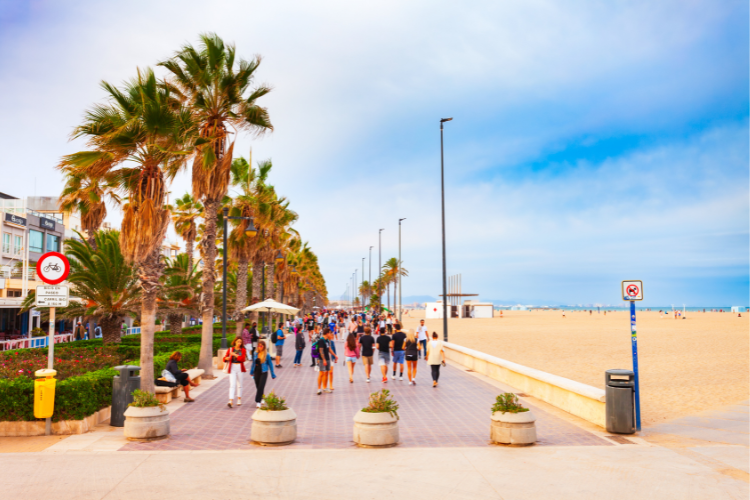Last Updated on March 15, 2024 by Laila Oliveira
The past few years have seen the digital nomad lifestyle gain popularity. The allure of escaping the monotonous daily commute and completely controlling your working hours is a dream for anyone seeking greater flexibility and work-life balance. So, how does the Spain Digital Nomad Visa allow you to explore this lifestyle easily?

If you’re a digital nomad interested in experiencing the Spanish lifestyle, this post is for you! Sit tight as we attempt to provide answers to some of the common questions about this new digital nomad visa and compare it to other digital nomad visas.
We’ll discuss the requirements, how long the process takes, the documents and fee structure, and how long you’ll be able to live in Spain. Happy reading!
Who is a Digital Nomad?
This is an individual who works remotely while exploring different destinations, hence the term nomad.
Digital nomads are typically characterized by their desire for freedom and flexibility in terms of both work and lifestyle. They travel frequently or live in different locations for extended periods, often choosing destinations based on factors like cost of living and quality of life.
Spain has swiftly emerged as a top choice for digital nomads due to its climate, culture, and adaptable laws favoring the nomadic lifestyle. In fact, CNBC ranks Spain as the number one destination for digital nomads in the world.
While Barcelona, Madrid, and Sevilla are among the top cities for digital nomads, different cities are slowly catching up.
What is the Spain Digital Nomad Visa?
As aforementioned, the Spain Digital Nomad Visa was only introduced in 2023 to improve entrepreneurship and encourage foreign investment. This particular Visa allows non-EU/EEA freelancers to live and work in Spain for up to one year with the potential of subsequent renewals.
While there is a possibility of renewing the Visa, the maximum duration you can stay in Spain on this Visa is five years. Keep in mind that you can only renew your Visa if you continue to meet the Spain Digital Nomad Visa income requirement.
This Visa is for foreigners working remotely for a foreign company or an employer outside Spain. If you are self-employed, you can work in Spain as long as the work does not exceed 20% of your total professional activity.
To qualify for the Visa, you must demonstrate proof of sufficient income to support yourself while in Spain and proof of health insurance coverage.
- Read Also: Types Of Visas For Spain: All Options For Expats.
Who can apply for this Visa?
The Spain Digital Nomad Visa is for non-EU/EEA freelancers and digital nomads who wish to work and live in Spain. Citizens of the European Union, the European Economic Area, or Switzerland can travel to Spain without needing a visa. This makes travel accessible to anyone of legal age.
However, the Spain Digital Nomad Visa is tailored for freelancers from regions outside the areas mentioned above, requiring them to meet specific qualifications and provide distinct documentation. Tag along to find out what documents you will need to provide.
Documents Required
Like other residency visas, remote workers must provide several documents demonstrating their eligibility for the specific visa category they are applying for. Here is a detailed list of the documents you need when applying for Spain’s Digital Nomad Visa.
- A valid Passport;
- Visa application form;
- A criminal record certificate;
- A recent passport-size colored photo;
- Proof of residence in the consular districts;
- Proof of paying the fees;
- A copy of private or public health insurance valid in Spain;
- Proof of income: You must earn €2,140 per month through payslips, work contracts, or bank statements. This is about 200% of the minimum wage in Spain. Depositing the money in a Spanish bank account will be an added advantage;
- If you are bringing dependents, You must provide marriage or birth certificates to prove your relationship with dependents;
- You must also provide an additional 75% of the minimum wage for the first accompanying dependant. You will need an extra 25% for each one if there are more dependants.
Like any unfamiliar legal procedure, we suggest consulting with a professional and addressing your questions in advance.
How to apply for the Spain Digital Nomad Visa?
Obtaining your Spanish digital nomad visa is a significant milestone. Here’s a step-by-step guide to the application process to help you understand how it operates.
- Begin by applying for your NIE; it is a requirement before going for your application.
- Gather all the required documentation. Certain documents may require an Apostille (a stamp that authenticates and legalizes foreign documents) and/or translation into Spanish. You can download the official checklist in English here.
- Schedule an appointment at your local embassy and pay the visa fee, typically through a bank transfer. The cost varies among countries but is generally around €80 and is non-refundable, even if your application is rejected.
- Attend your appointment and carry along all required documentation. The embassy or consulate will temporarily retain your Passport for assessment, and they may also make copies or verify your documents during the appointment.
- Upon approval, you have one month to collect your Visa from the embassy or consulate. If your application is denied, you will receive a written notification detailing the reasons for the refusal. You have one month to submit additional documentation and appeal the decision if you choose to do so.
Note that to improve your chances of visa approval, be sure to provide all the necessary documentation. This will also help you prevent unnecessary delays during the application. Once you get your Visa, you can start planning how to live your dream in Spain.
It is not uncommon for expats to fall in love with Spain; many choose to reside here permanently immediately after.

- Learn more about How To Live In Spain in 2024: Visas, Cities, Taxes & More!
How long does the Visa process take?
The processing time for the Spain Digital Nomad Visa can vary depending on various factors, such as the workload of the consulate or embassy where you apply, the completeness of your application, and the time of year.
In general, the process should take several weeks to a few months. It’s advisable to apply well before your planned travel dates to allow for any unexpected delays in processing. That said, the process should take 15 to 45 days under normal circumstances.
How long is the Spain Digital Nomad Visa Valid?
The Spain Digital Nomad Visa, also known as the Spain Remote Work Visa, is typically issued for an initial period of one year. However, it is possible to renew the Visa for up to five years.
This is only true if you continue to meet the eligibility criteria and comply with the visa requirements. Each renewal is usually for one year.
If your Spain Digital Nomad Visa has reached the maximum duration of five years but you wish to continue living in Spain, you have a few options:
- Apply for Permanent Residency: After living in Spain for five years with a digital nomad visa, you may be eligible to apply for permanent residency. This would allow you to live and work in Spain indefinitely.
- Apply for a Different Visa: You could explore other types of visas that may allow you to stay in Spain. Some good examples include a work visa, investor visa, or family reunification visa if you meet the requirements for these visas.
- Leave and Re-enter Spain: If you cannot secure another visa immediately, you may need to leave Spain and re-enter as a tourist or on a different visa. Of course, this will depend on your nationality and the visa requirements for your country.
It’s advisable to consult with an immigration professional to explore the best options for your specific situation.
Cost of the Spain Digital Nomad Visa
The cost of the Spain Digital Nomad Visa can vary depending on whether the consulate or embassy processes your application and your country of residence.
Generally, the visa fee is around €80, but this can change, so it’s important to check with the specific consulate where you plan to apply. (Refer to the consular fees).
Additionally, you may need to factor in other costs, such as translation of documents and travel expenses, to the embassy or consulate for your appointment. You also need to track other miscellaneous costs that may come up during the application process.
This can include travel expenses to the embassy or consulate for your appointment, fees for obtaining required documents, and other related expenses.
Overall, the total cost of the visa process can vary but is typically a few hundred euros when including all related expenses. It’s not much when you get to enjoy the affordable living costs in Spain with a high standard of living!
Let’s Move to Europe
With Viv Europe your plans for Europe will come to a reality
Taxes for Spain Digital Nomads
When considering immigrating to another country, one of the things you need to consider is the taxation system. This is very important since tax compliance is important for staying legally in any country. As a digital nomad in Spain, your tax obligations can vary depending on your specific situation and the nature of your income.
First and foremost, you are a tax resident if you spend over 183 days in the country within a calendar year. Another qualifying factor is if your primary professional activities or economic interests are in Spain. Tax residents pay taxes on their global income.
Spain provides a unique tax scheme for expatriates, known as the “Beckham Law.” It permits eligible individuals to choose to be taxed as non-residents for a specified period.
Under this arrangement, you pay a flat rate of 24% on your Spanish-sourced income up to €600,000 and 47% on income exceeding this threshold. But this is not all; if you do qualify under the Startup Act, you can get different tax rates.
This particular act allows you to pay taxes as a non-resident rather than as a resident. This is quite advantageous as it would mean paying a reduced 15% for four years instead of the standard 24%.

Is Spain Digital Nomad friendly?
Yes, Spain is generally considered digital nomad-friendly for a few reasons. This country offers a high quality of life, a pleasant climate, a rich culture, and diverse landscapes, making it an attractive destination for remote workers. Remember, the digital nomad is more than working on a computer all day.
You will need to attend to your adventurous side, which is why Spain is their destination. Introducing the Spain Digital Nomad Visa has been a game changer for digital nomads.
Through this program, you can enjoy the best of what Spain has to offer for a year, which you cannot do with a tourist visa. The country also has good internet infrastructure, especially in major cities and tourist areas, which is crucial for remote workers.
Overall, Spain is a great option for digital nomads looking for a mix of work, culture, and lifestyle. If this lifestyle appeals to you, all you have to do is apply for a visa and book a flight to Spain.
Top Cities for Digital Nomads in Spain
Spain boasts a rich cultural tapestry, making choosing the perfect destination for your digital nomad adventure difficult. Here is a quick breakdown of the top destinations. These rankings consider factors like quality of life, startup community availability, and other aspects of life.
- Barcelona: Known for its vibrant culture, stunning architecture, and thriving startup scene, Barcelona is a favorite among digital nomads. It offers a high quality of life with beautiful beaches, great food, and a lively atmosphere.
- Madrid: Spain’s capital city, Madrid, offers a mix of modernity and tradition. It has a bustling nightlife, world-class museums, and excellent public transportation, making it an attractive option for digital nomads.
- Valencia: With its beautiful Mediterranean beaches, charming old town, and modern architecture, Valencia is an excellent city for digital nomads looking for a more relaxed lifestyle. It also has a growing startup community and affordable cost of living.
- Seville: Seville is known for its rich history, stunning architecture, and vibrant culture. It offers a slower pace of life than other Spanish cities, making it ideal for digital nomads seeking a more laid-back lifestyle.
- Malaga: Located on the Costa del Sol, Malaga offers a great climate, beautiful beaches, and a low cost of living. It also has a growing digital nomad community and is well-connected to other European cities.
Do you want to become a Digital Nomad?
That concludes our guide to Spain’s Digital Nomad Visa! We trust this has answered all your queries about the digital nomad visa scheme and its prerequisites. You are now prepared to discover the myriad opportunities Spain has to offer!
If you require assistance with the process, don’t hesitate to reach out to our team of experts. Viv Europe is dedicated to helping you realize your dreams, regardless of your location in the world.
Join our Facebook Group – All About Portugal For Expats to connect with other expats and digital nomads like yourself. Meet people who have already moved to Spain and Portugal, those in the process, and others still considering their options.
Becoming a digital nomad in Spain or Portugal is among the most enriching life experiences one can enjoy, even if only briefly. But you don’t have to take our word for it; start your journey today and experience everything yourself. See you soon!





